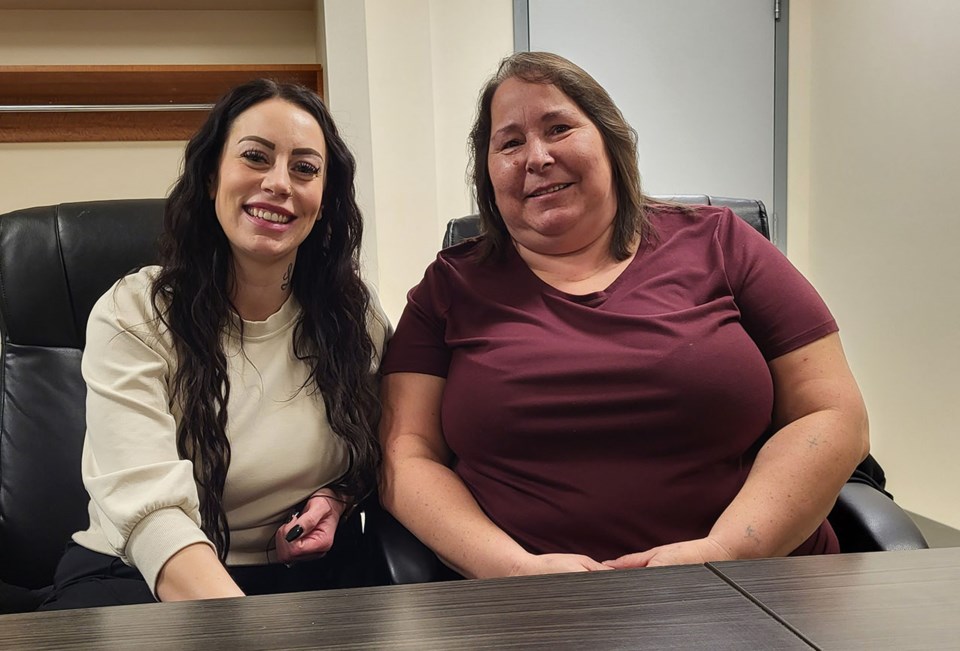One homeless woman in Prince George was so deep in her addiction she didn’t think she’d ever get out.
Kim Suel talks about how AWAC got her clean, housed, and on the right path to a very bright future.
Suel said she knows she would not have made it if it hadn’t been for the tenacious outreach workers at the Association Advocating for Women and Community who just wouldn’t leave her alone while she was struggling during her darkest days.
“I was in my addiction, sleeping on the streets, spending time in the hospital because of overdoses, going in and out of AWAC and then the outreach workers started connecting with me,” Suel said.
Mostly it was outreach workers Mark De Souza, who has since passed away, and Kayla Derkatch who made the connection with Suel.
“Mark and Kayla and a few other people said there is another way,” Suel said. “I did know there was but I was just too chaotic in my addiction at that time so then one day I just went up to Mark and said ‘I’m done, I am so done’ and Mark said to get into detox so I said Ok. When I tried to get into detox I OD’d on Feb. 6, 2022 and I went to my doctor and told him I was trying to get into detox and he said he’d help and the next morning I was in detox – he fast-tracked me.”
Detox was a real struggle but with medications and support from De Souza and Derkatch, Suel was able to make it through.
“I got stable and kept hanging on and hanging on,” Suel said. “I stayed for seven days and then Mark came and got me and brought me here to the Olive’s Branch.”
AWAC’s Olive’s Branch is a one- to three-year sober living, transitional housing program for individuals who are on their own unique journey of sobriety.
“Here they give you a clean, sober way of living and there are different programs and I followed the program – we did horse therapy, we did life skills, I did street humanities – it gives you a little bit of schooling.”
In partnership with AWAC, the College of New Caledonia offers street humanities as part of their continuing education program, where students get hot meals and bus passes to get to classes, tuition, books and other materials, study and discussion groups, a network for educational and emotional support, tours and orientation for a gradual integration into college life. Courses offered include anthropology, biology, English, First Nations studies, history, visual arts, psychology, math, business and sociology.
“We even had a dinner to celebrate,” Suel said, about graduating from the 12-week program.
“If I didn’t have all the support from the people at AWAC I wouldn’t have made it,” Suel said. “There was no way I would’ve made it. I would’ve bolted back out onto the street and still would have been living in my addiction.”
At Olive’s Branch Suel said there are so many programs to keep residents actively learning and engaged.
“So after six months I moved out of Olive’s Branch,” Suel said and into AWAC's housing readiness program.
The Housing Readiness program is a transitional housing program for individuals geared to cultivating independence through empowerment, life skills, wellness groups, and daily programming. Individuals are required to complete a program agreement and may stay for up to one year.
“I started working for them and they were training me here, there and everywhere and now I am doing outreach for them,” Suel said about AWAC. “I love it and I am out in the community working with people who need help shopping, getting to their appointments, and it’s just about helping people and I love doing it.”
The future looks bright for Suel.
“I can see a future and I’m doing things now that I have never done before,” Suel said. “I am with my grandson now and I am with all my children again and I got a bank account now – something I never had before and it’s got money in it. Now I am thinking about traveling – I am doing things I only dreamed about before.”
She’s thinking a trip to Europe might be nice – and maybe the Bahamas.
“There are so many places that I would love to go,” Suel laughed.
Suel is one of AWAC’s many success stories.
And that’s where the Coldest Night of the Year fundraiser comes in.
“The money raised during the Coldest Night goes towards programs,” Derkatch said, who is now the assistant manager of community services at AWAC. “We do a lot of different programs and the fundraiser really, really helps to support those.”
The fundraising effort will support AWAC, which is a non-profit organization, providing safe and supportive shelter for street-involved women and men. With the rate of homelessness increasing in Prince George AWAC has created Housing First, Outreach, Housing Readiness, Mark’s Place and Olive’s Branch therapeutic community house programs. All programs are open to all genders to better serve the community.
The Coldest Night of the Year takes place Feb. 25 and is a family-friendly walk that starts at St. Giles Presbyterian Church, 1500 Edmonton St. People can start gathering at 4 p.m. The walk begins at 5 p.m. and there is a hot meal ready at 6 p.m. once the two kilometre or five kilometre walk is completed by participants.
The fundraising goal is $34,000 and $22,223 has been raised so far.
Consider walking alone, with a friend or put a team together.
To donate or for more information about the event visit Prince George Coldest Night of the Year.



